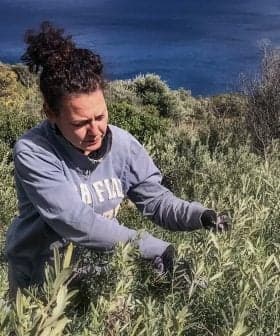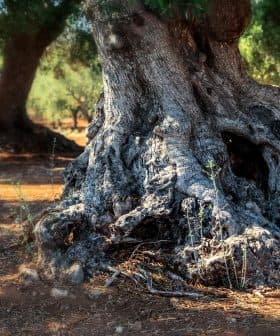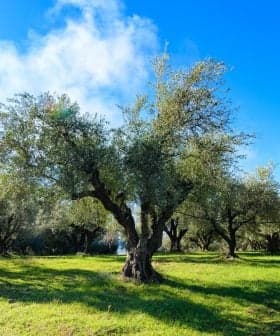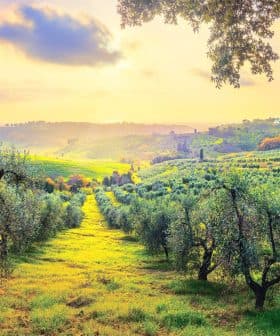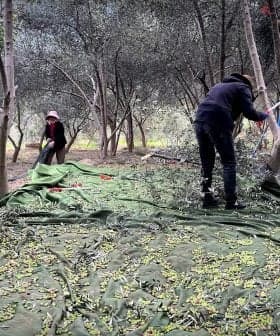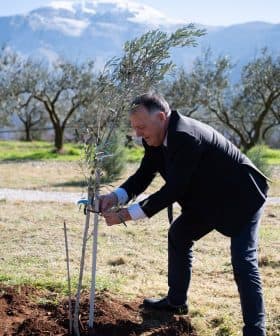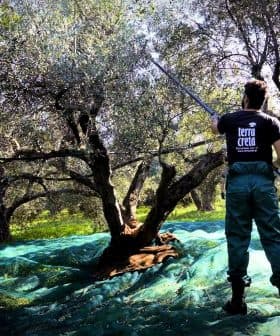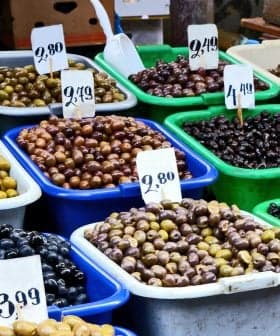Research Institute in Chania Emerges as Greek Olive Sector Leader
The Institute for Olive Tree and Subtropical Plants in Chania, Crete is a leading research and education center for the olive oil sector in Greece, receiving numerous grants from the International Olive Council for technical and promotional projects. Director Kostas Chartzoulakis is a keynote speaker at an IOC seminar on grants, and the Institute’s latest project aims to train olive sector stakeholders in Greece on innovative practices to mitigate climate change and meet market requirements.

Journalists hosted by the Institute for Olive Tree and Subtropical Plants in Chania, Crete observe harvest time.
The Institute for Olive Tree and Subtropical Plants in Chania, Crete has become a leader in research and education for the olive oil sector in Greece.
In the last five years the Institute has achieved International Olive Council (IOC) funding seven times, while receiving the equivalent number of grants. These grants have co-funded technical and promotional projects including cutting-edge research, seminars and conferences, inviting journalists from key import countries to Crete, training producers and other stakeholders to improve quality and educating consumers on the nutritional value and the culture of olive oil.
Kostas Chartzoulakis, the director of the institute, is at the IOC headquarters today, September 9, as a keynote speaker at a seminar on grants to talk on what qualifies as a successful application for an IOC grant and how to submit grant documentation.
Their latest addition to their tally of grants is a project called “Training olive sector’s stakeholders in diverse areas in Greece on innovative practices to mitigate climate change and meet market’s requirements.” The project will run from October, 2013 to February, 2014 and its aim is to transfer innovative practices on all critical aspects of olive oil production to olive oil professionals and producers of central and northern Greece.
Chartzoulakis says that it is important to clarify what is meant by the term innovative:
“The Institute for Olive Tree and Subtropical Plants recognizes that there is a constant need of education and information. Producing extra virgin olive oil is not the quest in hand. Rather, it is which cultivation and processing methods bring out the particular sensory and nutritional properties of Greek olive oil varieties.
Our research suggests that, due to the agro-economic conditions in Greece, this can only be achieved by low input and environmentally friendly cultivation practices. Examples of such practices include the use of olive residues (pruning waste, olive pomace and olive mill water waste) as a fertilizer, the application of deficit irrigation techniques and integrated pest and disease management. It is expected that there will be a significant reduction in the CO2 and water footprint of the produced olive oil while costs can be reduced by up to 30 percent.”

The Institute for Olive Tree and Subtropical Plants in Chania, Crete
Chartzoulakis is also a co-editor of the book Following Olive Footprints Cultivation and Culture, Folklore and History, Tradition and Uses (2012), a joint publication of the IOC with the Association of Agricultural Research Institutions in the Near East and North Africa (AARINENA) and the International Society for Horticultural Science (ISHS), and is currently overseeing its translation in Greek.


